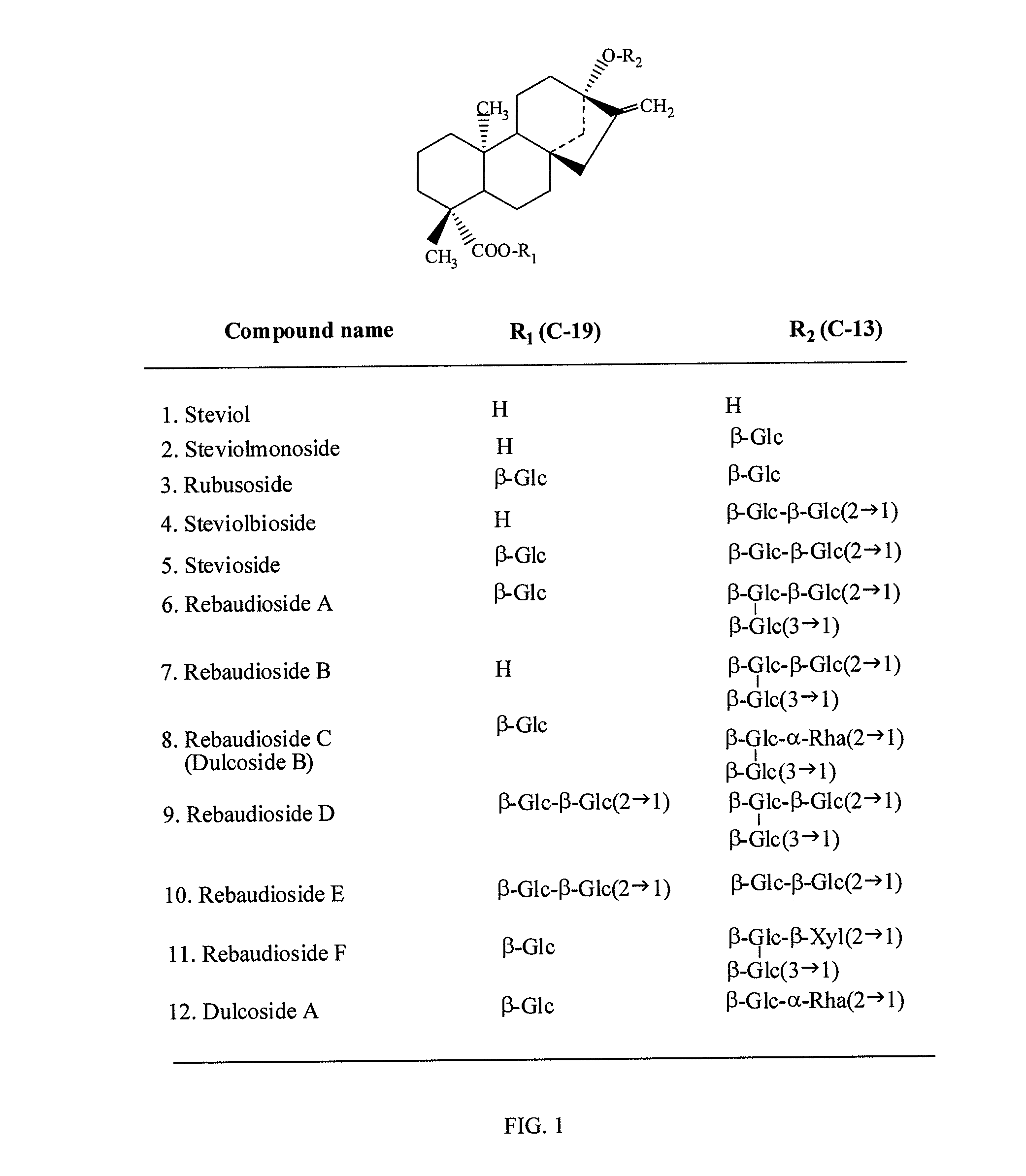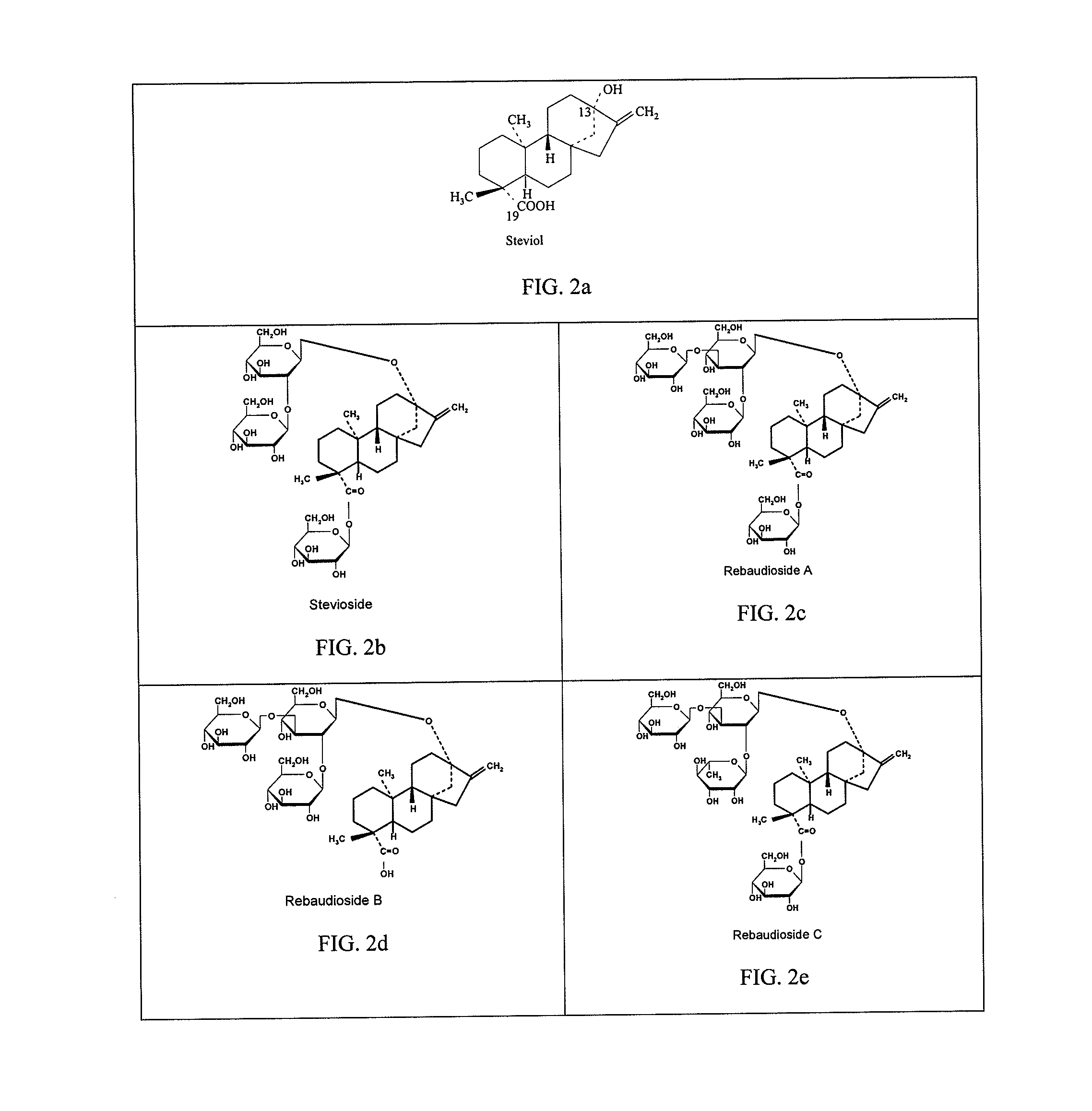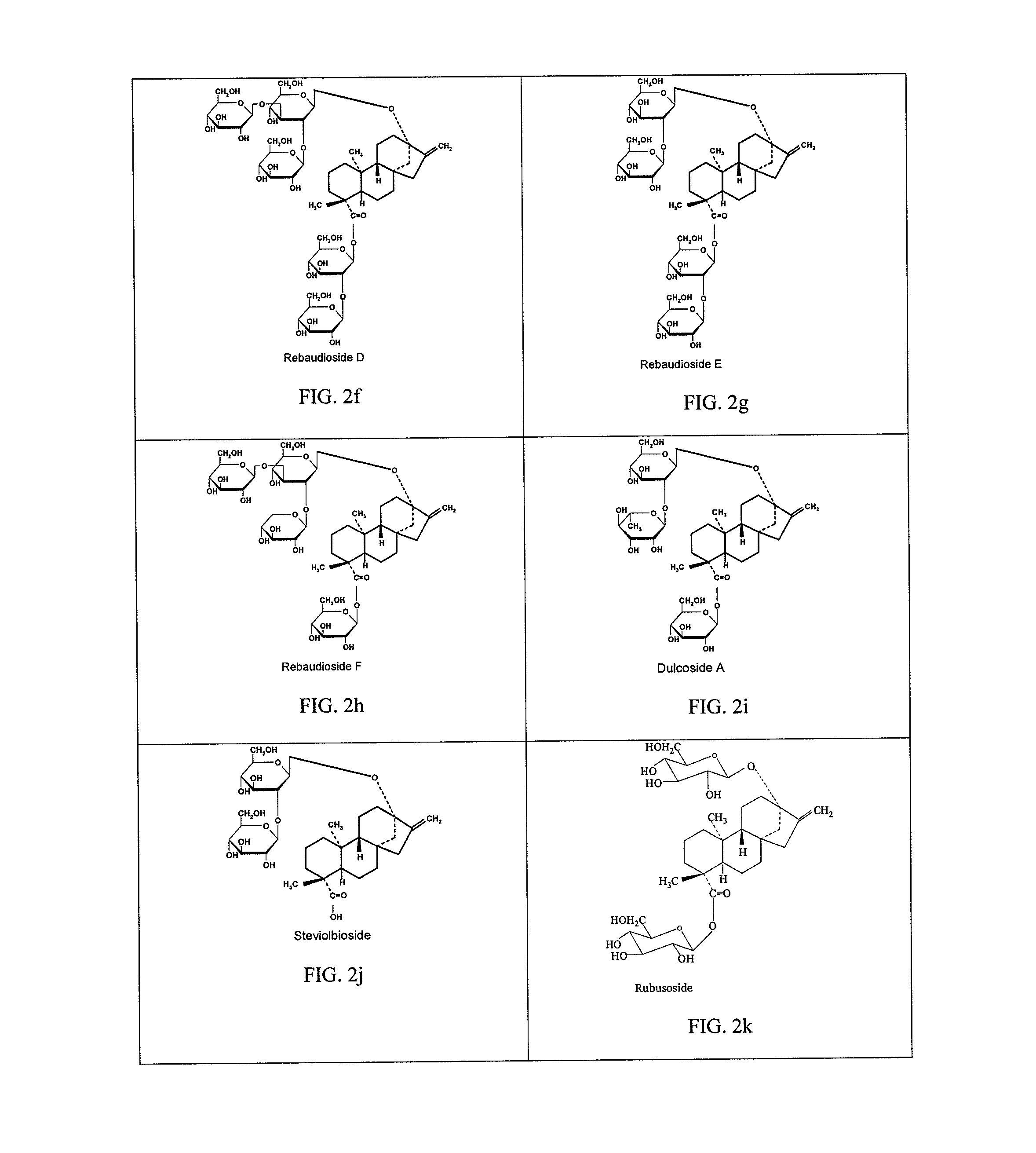High-purity steviol glycosides
a technology of steviol glycosides and steviol glycosides, which is applied in the field of high-purity steviol glycosides, can solve the problems of rebaudioside d in stevia leaves or steviol glycoside preparations, the temporal and/or flavor profile is not uniform, and the isolation and purification of steviol glycosides is a very difficult task, and achieves high purity.
- Summary
- Abstract
- Description
- Claims
- Application Information
AI Technical Summary
Benefits of technology
Problems solved by technology
Method used
Image
Examples
example 1
Purification of Reb D from Stevia rebaudiana Bertoni Plant Leaves
[0321]Two kg of Stevia rebaudiana Bertoni plant leaves were dried at 45° C. to an 8.0% moisture content and ground to 10-20 mm particles. The content of different glycosides in the leaves was as follows: Stevioside—2.55%, Reb A—7.78%, Reb B—0.01%, Reb C—1.04%, Reb D—0.21%, Reb E—0.02%, Reb F—0.14%, Dulcoside A—0.05%, and Steviolbioside—0.05%. The total content of steviol glycosides was 11.85%. The dried material was loaded into a continuous extractor and the extraction was carried out with 40.0 L of water at a pH of 6.5 at 40° C. for 160 min. The filtrate was collected and subjected to chemical treatment. Calcium oxide in the amount of 400 g was added to the filtrate to adjust the pH within the range of 8.5-9.0, and the mixture was maintained for 15 min with slow agitation. Then, the pH was adjusted to around 3.0 by adding 600 g of FeCl3 and the mixture was maintained for 15 min with slow agitation. A small amount of c...
example 2
Purification of Reb D and Reb A from Stevia Extract
[0335]One kg of Stevia extract containing Stevioside—22.63%, Reb A—52.46%, Reb C—7.52%, Reb D—1.18%, Reb B—0.55%, Reb E—0.64%, Reb F—1.79%, Steviolbioside—0.1%, and Dulcoside A—1.59%, with 88.46% of total steviol glycosides content, was dissolved in 3000 mL of 95% ethyl alcohol and maintained at 80° C. for 35 min, and then at 15° C. for 12 hours with agitation. When the temperature reached 22° C., 1.0% of highly purified Reb A was added to the reaction mixture as a starter to initiate crystallization.
[0336]Precipitate was separated by filtration and washed with about two volumes of 99.5% ethanol.
[0337]The yield of crystalline material was 47.1% with content of 81.7% and 3.3% of Reb A and Reb D respectively.
[0338]The precipitate was mixed with 5 volumes of 78% ethanol and incubated at 50° C. for 3 hours with agitation. Then, the mixture was cooled down to room temperature and the precipitate with 21.4% Reb D content was separated by ...
example 3
Purification of Reb D and Reb A from Stevia Extract
[0343]One kg of Stevia extract containing Stevioside—22.63%, Reb A—52.46%, Reb C—7.52%, Reb D—1.18%, Reb B—0.55%, Reb E—0.64%, Reb F—1.79%, Steviolbioside—0.1%, and Dulcoside A—1.59%, with 88.46% of total steviol glycosides content, was dissolved in 3000 mL of 88% ethyl alcohol and maintained at 55° C. for 15 min, and then at 22° C. for 24 hours with agitation. When the temperature reached 22° C., 1.0% of highly purified Reb A was added to the mixture as a starter to initiate crystallization. The precipitate was separated by filtration and washed with about two volumes of 99.5% ethanol.
[0344]The yield of crystalline material was 33.0% with content of 95.6% and 3.5% of Reb A and Reb D respectively.
[0345]The precipitate was mixed with 3.0 volumes of anhydrous methanol and incubated at 22° C. for 90 minutes, and the precipitate with content of 98.9% Reb A was separated by filtration, washed with about two volumes of anhydrous methanol ...
PUM
| Property | Measurement | Unit |
|---|---|---|
| temperature | aaaaa | aaaaa |
| temperature | aaaaa | aaaaa |
| temperatures | aaaaa | aaaaa |
Abstract
Description
Claims
Application Information
 Login to View More
Login to View More - R&D
- Intellectual Property
- Life Sciences
- Materials
- Tech Scout
- Unparalleled Data Quality
- Higher Quality Content
- 60% Fewer Hallucinations
Browse by: Latest US Patents, China's latest patents, Technical Efficacy Thesaurus, Application Domain, Technology Topic, Popular Technical Reports.
© 2025 PatSnap. All rights reserved.Legal|Privacy policy|Modern Slavery Act Transparency Statement|Sitemap|About US| Contact US: help@patsnap.com



